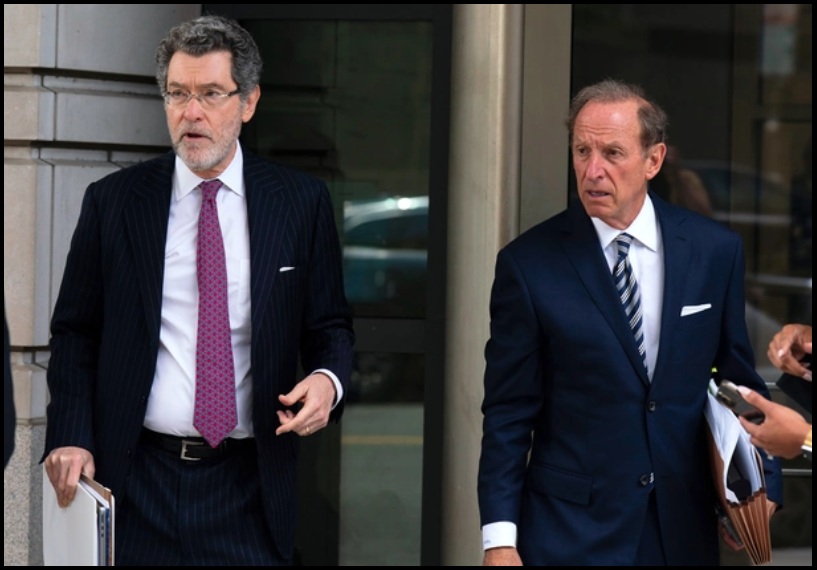


We see things for what they are, not what media try to have us believe.
Unlike the first term playbook, the Lawfare operation against President Trump is facing a more affirmed attack posture. Instead of Trump (T1) being on constant defense, Trump (T2) is strategically willing to be more confrontational and direct against the use of Lawfare and corrupt courts against Trump’s intended policy changes.
T2 Main Justice is still not going to the mattresses as many of us would like, and factually the DOJ and FBI operations are still a weakness in the overall war against the radical left; however, they do appear to recognize that direct aggressive confrontation is needed – despite the shortcomings in their capabilities.
In the fight between the executive authority and Federal Reserve board member Lisa Cook, the embattled fed governor is being represented by Norm Eisen. Eisen, together with Mary McCord and other ideological travelers represent Lisa Cook and are using the issue as a point of attack against executive power.
In the latest development, in a 2-1 decision [SOURCE HERE], a federal appeals court has rejected President Donald Trump’s bid to quickly fire Federal Reserve board member Lisa Cook. The two justices who decided to block Trump were appointed by Joe Biden. The justice who sided with the executive authority was appointed by President Trump.
Ultimately, this issue is going to the Supreme Court where hopefully the highest court will rule that President Trump can remove Lisa Cook for cause, because Cook falsified federal mortgage loan documents. But in the bigger picture, the issue around Cook is not as much about her unlawful conduct, as it is the value of what Cook represents in the fight against President Trump.
WASHINGTON DC – […] Judges J, Michelle Childs and Bradley Garcia, both Biden appointees, voted to leave Cook in her post, while Judge Gregory Katsas, a Trump appointee, dissented. The Department of Justice declined comment.
Last week, U.S. District Judge Jia Cobb rejected Trump’s bid to remove Cook just three years into her 14-year term, saying the president’s justification for the firing — mortgage fraud allegations that have not been adjudicated in any forum — did not meet the legal requirements to overcome laws protecting the independence of the Federal Reserve.
While the Supreme Court has repeatedly endorsed Trump’s efforts to remove executive branch officials Congress has sought to insulate from politics, the justices have signaled they view the Federal Reserve as a unique “quasi-private” institution that may put it in a different legal category.
Federal law gives Trump the power to fire members of the Federal Reserve Board of Governors “for cause,” which typically means misconduct or malfeasance on the job. Trump said he had cause to fire Cook due to allegations that she claimed in separate mortgage applications that two different homes were her primary residence, which can entitle a homeowner to lower rates. Cook has denied the allegations.
The D.C. Circuit’s majority said there was “no need” at this stage of the case for the appeals court to address whether the allegations against Cook meet the “for cause” standard to fire a Fed member or what that standard would require. Childs and Garcia agreed with Cobb’s finding that Cook’s due process rights appeared to have been violated because she wasn’t properly notified of the accusations against her and given a chance to dispute them.
In his dissent, Katsas grappled directly with the definition of “for cause” firing protections for Federal Reserve board members, concluding that the law gives the president broad power to define the “cause.”
“The Board of Governors no doubt is important, but that only heightens the government’s interest in ensuring that its Governors are competent and capable of projecting confidence into markets,” Katsas wrote. “And in empowering the President to remove Governors for cause, Congress has specifically assigned that task to the President.”
Delving into the president’s determination of cause, Katsas wrote, “would enable a potentially compromised Governor to engage in significant governmental action — such as voting on whether to adjust interest rates, which Cook says she must do tomorrow.”
The Trump administration’s expected emergency appeal will go to Chief Justice John Roberts, who oversees such appeals out of the D.C. Circuit. He’s all but certain to escalate the issue to the full court, but could issue a temporary order blocking Cook from remaining in her post while the litigation plays out. (more)
Norm Eisen left, Abbe Lowell right. Both lawyers for Lisa Cook
Norm Eisen is a well-known Lawfare operative, second only to Mary McCord in his high visibility and connections to all of the anti-Trump efforts. Eisen, like McCord, is at the center of the leftist effort to stop the Trump agenda through the manipulation of the courts, ie. ‘Lawfare.’


